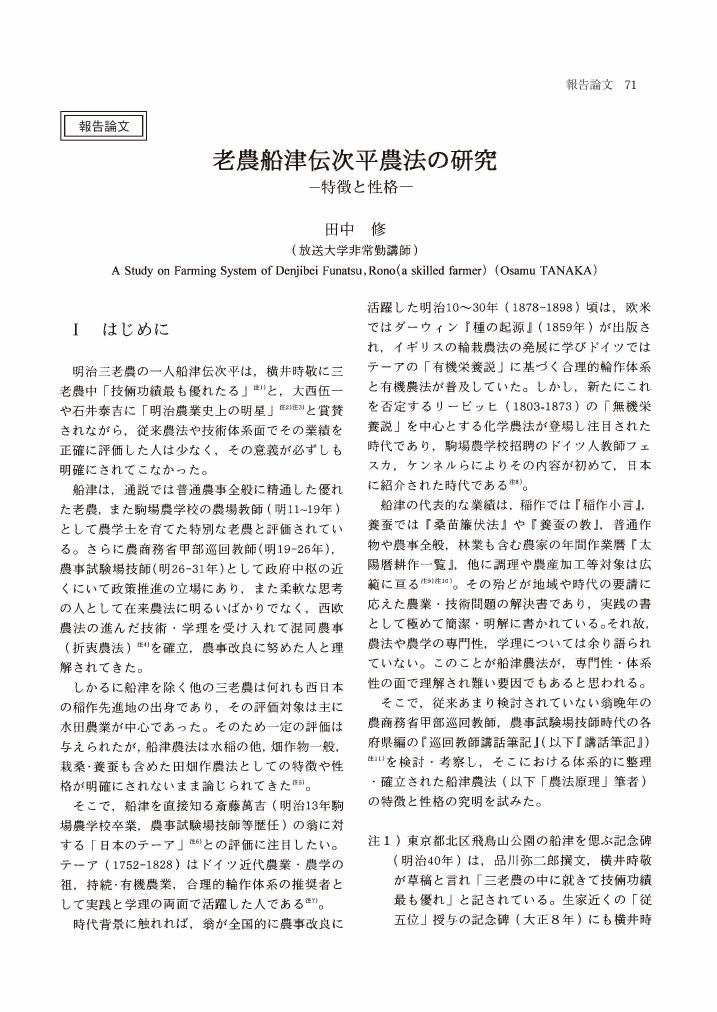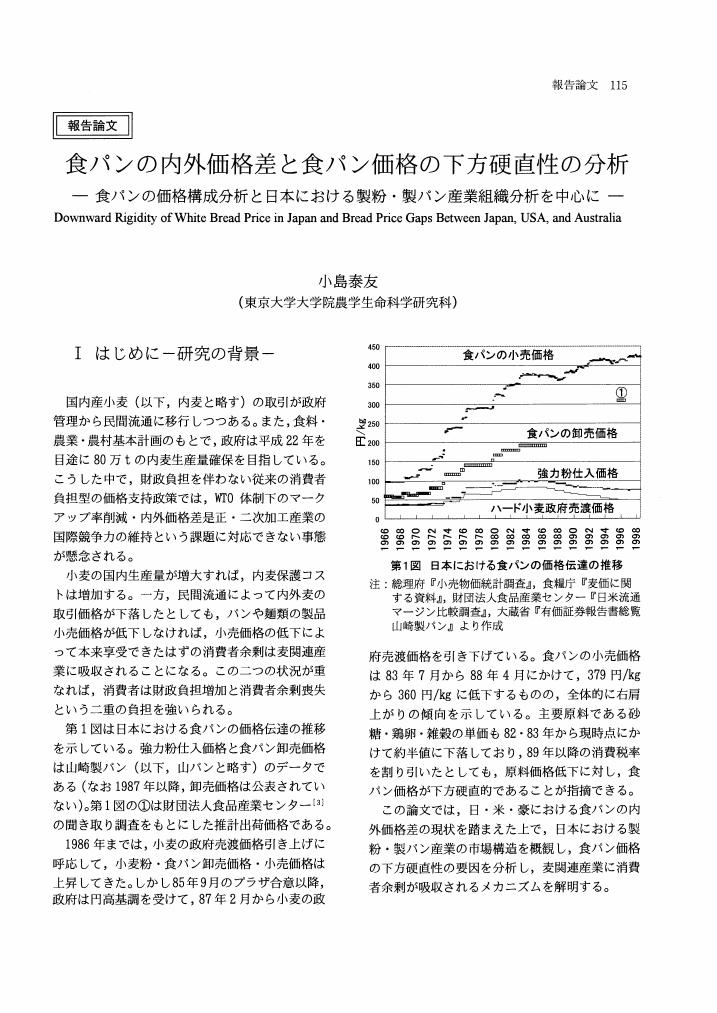1 0 0 0 OA 老農船津伝次平農法の研究
- 著者
- 田中 修
- 出版者
- 日本農業経営学会
- 雑誌
- 農業経営研究 (ISSN:03888541)
- 巻号頁・発行日
- vol.51, no.1, pp.71-76, 2013-06-25 (Released:2016-06-01)
- 参考文献数
- 21
1 0 0 0 OA アフリカの小規模家族農業における経営計画モデルの構築
- 著者
- 小出 淳司 山田 隆一 大石 亘
- 出版者
- 日本農業経営学会
- 雑誌
- 農業経営研究 (ISSN:03888541)
- 巻号頁・発行日
- vol.56, no.3, pp.1-12, 2018-10-25 (Released:2019-11-01)
- 参考文献数
- 10
In this study, we develop a farm management model that incorporates the livelihood structures of African smallholders and their farming conditions. The model is based upon a comprehensive linear programming approach using smallholders’ farm and non-farm data collected in different agroecological zones of the Nacala Corridor, Northern Mozambique. With the model, we examine optimal crop combinations in each zone that maximize the total income among smallholders depending on their available resources and farm risks. The results suggest that upland crop diversification is effective in increasing the income in zones with relatively high production and market risks. The result also attaches importance to increasing the production of the most lucrative beans and tubers cultivated in each zone for livelihood improvement, as well as increasing the major food staples produced in order to achieve food self-sufficiency, especially among those with more than 1 hectare of farmland. Those with less than 1 hectare of farmland would also derive improved livelihood from expanding the cultivatable area, which is feasible considering actual land and labor availability. Given the current level of productivity, however, the next generation would face food shortages and farm economic decline as farmland area is reduced as a consequence of land division after inheritance. Further efforts should thus be geared toward evaluating productivity-enhancing cropping systems and technologies that reflect the relevant data into such a model as established in this study.
1 0 0 0 OA 施設花き生産現場における改善活動の導入とその効果
1 0 0 0 OA 農業法人の輸出取組と経営規模・収益性
1 0 0 0 OA 農地流動化に対する転用期待の影響に関する定量分析
1 0 0 0 OA 現代農業における家族経営の論理
- 著者
- 岩元 泉
- 出版者
- 日本農業経営学会
- 雑誌
- 農業経営研究 (ISSN:03888541)
- 巻号頁・発行日
- vol.50, no.4, pp.9-19, 2013-03-25 (Released:2015-05-25)
Japanese farming entities were characterized as family farms for a long time. Recently, however, family farms are relativized in the context of the diversification of types of farming entities. The definition of family farms has become vague despite agricultural policies to promote the establishment of vital family farms as a new structural policy target. We can observe the polarization of farming entities ranging from large scale farm businesses to small and rather small scale family farms throughout the world. In this symposium, we discussed first the changing internal and external factors of Japanese family farms. Second, we pointed out the roles and significance of family to farming business. Third, several features regarding the future of Japanese family farm are argued. Fourth, we presented the problems of family farms in a globalized economy.
1 0 0 0 OA 農業における「企業経営」と「家族経営」の特質と役割
- 著者
- 内山 智裕
- 出版者
- 日本農業経営学会
- 雑誌
- 農業経営研究 (ISSN:03888541)
- 巻号頁・発行日
- vol.48, no.4, pp.36-45, 2011-03-25 (Released:2015-03-20)
- 参考文献数
- 26
- 被引用文献数
- 1
This study revealed that there is no definite line of demarcation between "corporate farming" and "family farming." A lot of networking organizations and franchise organizations are observed in "family farms." Simultaneously, there are few cases of "corporate farming" that have absolutely no family elements. Nevertheless, across countries and regions, almost all farm businesses share features of both "somewhat familial" and "somewhat business-oriented."In the USA, there are arguments for and against "corporate farming", and some states restrict corporations from entering farming by prohibiting them from acquiring farmland. The main reasons against "corporate farming" are concerns about (1) a decrease in the number of family farms, (2) rural economy decline, (3) monopolistic and oligopoly markets, (4) environmental impacts, and (5) animal welfare. However, in fact, a main cause for these changes could well be technological changes, while "corporate farming" may not always be the main cause. On the other hand, a vital condition for "corporate farming" in crop production is economies of scale, with a previous study suggesting that economies of scale have been observed in very large family farms, and thus the viability of non-family corporate farming may be verified even in the USA. Another issue being discussed is the definition of "family farm." If the definition is changed with respect to land ownership, labor and farm size, the number of farms that could be classified as "family farm" would be limited substantially.When "corporate farming" and "family farming" are considered, family business studies should be focused. Family business studies observe any firms that are owned in some form on a family-basis, and explore the issues including governance through family and business succession. Farm businesses and family businesses have a lot in common, such as their attitudes to enhance their relationship with the local community. It will become important to consider the viability of farm business development by applying the concept of family business studies.In crop production, it is anticipated that the mainstream of farm businesses will be based on family farms, at least for the time being, and the conditions for increased non-family corporate farming are limited. Therefore, in farm business management studies, it is important to contribute to the development of sustainable business models in any farm businesses that are operated with sincerity. It is also a vital effort to accumulate studies to solve urgent problems in "farm family businesses," including farm succession, family governance, and obtaining business resources in order to put "corporate farming" in perspective.
1 0 0 0 OA 農業経営の外部環境のマネジメント
- 著者
- 木南 章
- 出版者
- 日本農業経営学会
- 雑誌
- 農業経営研究 (ISSN:03888541)
- 巻号頁・発行日
- vol.38, no.4, pp.15-23, 2001 (Released:2012-10-29)
- 参考文献数
- 24
1 0 0 0 OA 産地形成に寄与する実践コミュニティの役割
1 0 0 0 OA 食パンの内外価格差と食パン価格の下方硬直性の分析
- 著者
- 小島 泰友
- 出版者
- 日本農業経営学会
- 雑誌
- 農業経営研究 (ISSN:03888541)
- 巻号頁・発行日
- vol.39, no.2, pp.115-118, 2001 (Released:2012-10-29)
- 参考文献数
- 3
1 0 0 0 OA 地域特産物消費に関する実証的研究
1 0 0 0 OA I 大農方式と小農技術
- 著者
- 金沢 夏樹
- 出版者
- 日本農業経営学会
- 雑誌
- 農業経営研究 (ISSN:03888541)
- 巻号頁・発行日
- vol.8, no.1, pp.3-18, 1970 (Released:2012-10-29)
1 0 0 0 OA 農協組合員勘定制度とキャッシュフロー会計
1 0 0 0 OA 米購入時における消費者の意思決定過程の実態と特徴
1 0 0 0 OA 傾斜地水田(棚田)稲作の維持継続を可能とする生産組織の仕組みに関する一考察
- 著者
- 小林 恒夫
- 出版者
- 日本農業経営学会
- 雑誌
- 農業経営研究 (ISSN:03888541)
- 巻号頁・発行日
- vol.40, no.2, pp.104-107, 2002 (Released:2012-10-29)
- 参考文献数
- 5
1 0 0 0 OA 農産物輸入関税割当制度改革の効果と影響
- 著者
- 福田 竜一
- 出版者
- 日本農業経営学会
- 雑誌
- 農業経営研究 (ISSN:03888541)
- 巻号頁・発行日
- vol.44, no.2, pp.36-40, 2006 (Released:2012-10-29)
- 参考文献数
- 2
1 0 0 0 OA 都市農業としての露地やさい作の存在形態
- 著者
- 山本 勝成
- 出版者
- 日本農業経営学会
- 雑誌
- 農業経営研究 (ISSN:03888541)
- 巻号頁・発行日
- vol.12, no.1, pp.26-27, 1974 (Released:2012-10-29)
1 0 0 0 OA 年齢階層別にみた生鮮野菜の消費動向と需要予測
1 0 0 0 OA 奈良盆地における田畑輪換の成立
- 著者
- 宮本 誠
- 出版者
- 日本農業経営学会
- 雑誌
- 農業経営研究 (ISSN:03888541)
- 巻号頁・発行日
- vol.19, no.2, pp.35-46, 1981 (Released:2012-10-29)













